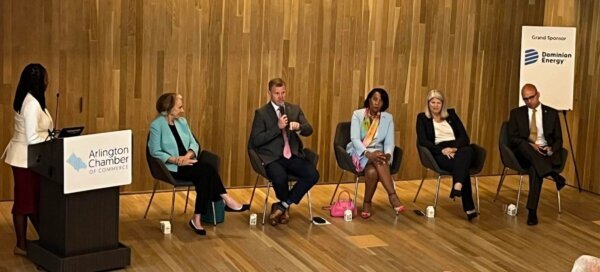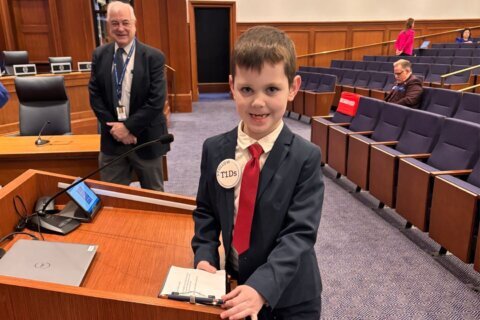This article was republished with permission from WTOP’s news partner InsideNoVa.com. Sign up for InsideNoVa.com’s free email subscription today.
This article was written by WTOP’s news partner, InsideNoVa.com, and republished with permission. Sign up for InsideNoVa.com’s free email subscription today.

Prince William Board of County Supervisors Chair Ann Wheeler on Tuesday participated in the Northern Virginia Regional Elected Leaders Summit, during which local officials assessed the region’s economy and brainstormed how it can be improved through intergovernmental collaboration.
Officials at the eighth annual event, held in Arlington County at Marymount University and hosted by the Arlington Chamber of Commerce, discussed how the region should be addressing office vacancy in the wake of the remote work revolution, how to create additional affordable housing as demand rises and how to confront a $750 million budget shortfall that could batter the Washington Metropolitan Area Transit Authority, which manages the region’s Metro transit system.
Wheeler spoke on a panel alongside fellow Democratic leaders Arlington County Board Vice Chair Libby Garvey, Fairfax Board of County Supervisors Chair Jeffrey C. McKay, Loudoun County Board of County Supervisors Chair Phyllis Randall and Alexandria Mayor Justin Wilson. U.S. Sen. Mark Warner also spoke during a separate panel, addressing many of the same issues as the local officials.
Wheeler and Warner said the event was an exemplary showing of regional collaboration at a time when governments both locally and nationally are impeded by division. Wheeler said it’s important that leaders set a tone of civility while showing they’re willing to “take the high road” — even in tense disputes.
Wheeler is set to vacate office at year’s end after losing the Democratic primary election in June. Wheeler, who had never held public office prior to being elected in 2019, praised the officials sitting beside her and thanked them for their guidance throughout her tenure.
Addressing office vacancies
Most officials agreed that the region must rethink its use of commercial office space in the post-pandemic era as most workers, including federal employees, continue to work from home. They pushed for continuing investment in transit-oriented development to connect commuters to desirable neighborhoods.
In Fairfax, McKay said officials should be looking to develop office spaces that accommodate reasons why workers might choose to come into the office, such as collaborative work spaces to be with colleagues rather than in cubicles.
Randall encouraged officials to accept the reality that many office workers don’t intend to return to offices and that local leaders should plan accordingly.
While Prince William has limited commercial office space relative to its neighbors, Wheeler said the county has transformed itself from a “sleepy bedroom community” to a rapidly growing industrial hub where companies are vying for land to develop on.
Under her leadership, Prince William has nearly doubled its tax revenue from data centers, which now accounts for a substantial portion of the county’s core commercial tax base. Last year, data centers accounted for more than $101 million in tax revenue for the county, up more than 1,535% from where the county was in 2012 when the industry began taking off.
Affordable housing
Wheeler said Prince William is lagging behind the region with its expansion of affordable housing, but she noted her administration is constantly working to include affordable units in new developments. She said it’s imperative that local governments keep out the way of developers and make it easier for them to build housing.
Wheeler also decried local efforts to oppose affordable housing, as both Brentsville Supervisor Jeanine Lawson and Gainesville Supervisor Bob Weir have planned a forum next week for residents to discuss the Highpointe High Density Apartment, a proposed rezoning to make way for 144 housing units at the intersection of James Madison Highway and Route 15 in Haymarket. Both supervisors frequently oppose development in more rural areas.
McKay made the case that affordable housing should no longer be framed as a moral quandary, but rather an essential economic development engine.
Randall said that officials must have the “political courage” to get affordable housing projects off the ground and be willing to lose their seats in the name of that goal.
Education
Officials were troubled by a July report released by the state that found Virginia is underfunding its schools relative to neighboring states, including Maryland and West Virginia. Many of them argued that education is a crucial pipeline to maintaining a robust economy and ensuring that those who are educated in the state stay and have careers.
Metro shortfall
As Metro faces a $750 million budget shortfall that could substantially impact service levels, officials called on the state and federal government to increase investments in the system that’s currently funded largely by a patchwork of local jurisdictions.
Randall argued that Metro’s role in connecting workers to major government installations like the Pentagon transcends the transit system from simple rail and bus lines to essential federal infrastructure.
While there are no Metro stations in Prince William, Wheeler said it remains important infrastructure for residents of the county who might use it. She also voiced support for expanding Metrorail from southern Fairfax into eastern Prince William in the coming decades.
Warner was less enthusiastic about immediately backing additional federal and state funding for Metro in the aftermath of pandemic windfall money that has kept it afloat, saying he wanted to investigate the agency’s spending more closely.







